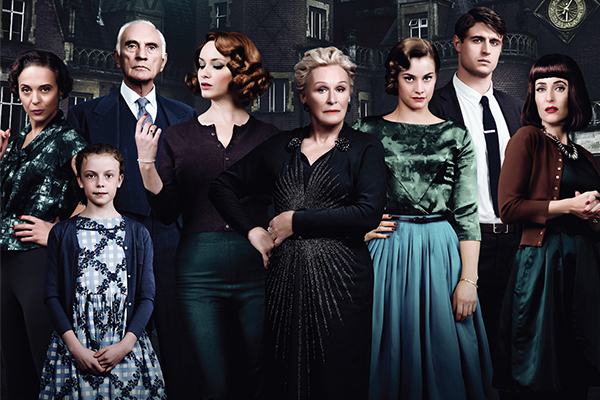Features
Christie Film Recommendations

Mark Aldridge recommends Agatha Christie film adaptations
If you’re an Agatha Christie fan then you have probably seen at least one of the two big-screen adaptations of Murder on the Orient Express – the first with Albert Finney as Poirot in 1974, and more recently Kenneth Branagh’s 2017 take on the Belgian sleuth’s most famous case. This story lends itself so well to the big screen, because of the initial sense of travel and adventure, the huge range of characters on board, as well the locked-room mystery element when the Orient Express is caught in a snowdrift. But this is by no means the only famous story that will transport you away from your front room. Here are some recommendations for Agatha Christie films that you might enjoy…
And Then There Were None (1945, 1965)
Christie’s most adapted story, And Then There Were None has had many screen treatments over the years, both as full adaptations and as pastiches. The mystery had a strong start at the cinema, with René Clair’s acclaimed 1945 adaptation of Christie’s stage version of the story setting the bar high. However, for sheer entertainment value you may also enjoy the rather sillier 1965 take on the story. In this version the characters are stranded atop a snowy mountain rather than on an island, with pop star Fabian choking to death not long after he performs the nursery rhyme, while Bond girl Shirley Eaton helps to place the film firmly in the swinging sixties. There’s even a ‘Whodunit Break’, with the audience encouraged to discuss who they think the villain is while the action is paused at a crucial moment. It’s difficult to resist the camp fun of it all.
Witness for the Prosecution (1957)
It’s probably no coincidence that the Billy Wilder film of Christie’s play Witness for the Prosecution emphasises the embellishments that the Queen of Crime herself had added when adapting the original short story for the stage. This screen treatment focuses on more detailed characterisation, and adds humour (played most effectively by real life married couple Charles Laughton and Elsa Lanchester), which makes the mystery all the more exciting. The genius of the story is in the acrobatics it performs to distract the audience from the simple truth at its core, in which charming Leonard Vole (Tyrone Power) is on trial for murder. However, the film is much more than a simple courtroom drama, and Marlene Dietrich’s performance as Vole’s wife is captivatingly clever. This was the first film adaptation that Christie really liked, and she entered into a warm correspondence with Wilder. Perhaps this should be no surprise, as the final result may be the best Agatha Christie adaptation of all.
Endless Night (1972)
Arguably one of Christie’s best novels, one problem with bringing Endless Night to the screen is that it’s not really clear exactly what sort of story is being told for a very long time. It was fortunate, then, that in the late 1960s and early 1970s psychological thrillers with a vaguely supernatural edge were in fashion on cinema screens, and so the story was a good fit for contemporary trends. Director Sidney Gilliat imbues the film with plenty of atmosphere, using artistic licence to hint at spooky events that may also have a more mundane (but chilling) explanations. Hywel Bennett and Hayley Mills star as the troubled young couple at the centre of a story about power and trust, much of which plays out at their ostentatiously modern dream home. The final result is a ruthless and contemporary thriller that riffs on an idea that Christie had been using for half a century by this point.
Death on the Nile (1978) and Evil under the Sun (1982)
For sheer entertainment value it’s difficult to beat the lavish adaptations of Death on the Nile and Evil under the Sun, which both star Peter Ustinov as Poirot. He may be a less serious (and more human) character than Finney’s blustering portrayal, but he’s certainly having a lot more fun and it’s impossible not to be swept along by the all-star casts and occasional murders in sunny climes that form the backbone of these two big budget movies. Each have their champions, but Evil under the Sun’s injection of snarking bitchery between Dames Maggie Smith and Diana Rigg is particularly difficult to resist. However, neither adaptation loses sight of the brilliant mysteries at their core, both of which have breathtaking conclusions that are played out perfectly.
Crooked House (2017)
Film and television versions of the 1949 novel Crooked House had been announced several times over the years before finally making it to the screen, with different projects having scripts written and even casting decisions made before slipping into obscurity again. Because of these repeated disappointments it was quite a surprise when this film version of one of Christie’s personal favourites finally materialised in late 2017, and perhaps even more of a surprise when the stellar cast was revealed, including the likes of Glenn Close, Christina Hendricks and Gillian Anderson. This dark tale of a family murder is perfect for the screen, and this faithful retelling’s methodical approach means that the viewer has every opportunity to work out the truth behind events – but you can be pretty sure that most of us won’t.

Dr Mark Aldridge is a senior lecturer in Film and Television at Solent University, and an Agatha Christie historian. He is author of Agatha Christie's Poirot: The Greatest Detective in the World, which tells the story of a century of the Belgian detective, and Agatha Christie on Screen .


 USA
USA 